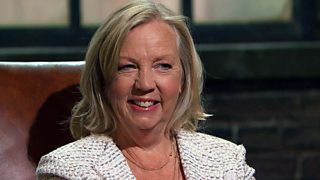Will you ever be able to afford to retire?
Many people daydream about their retirement years and the holidays, hobbies and happiness they hope to have. But concerns over whether working-age people will have enough to live on continue to grow.
When 大象传媒 Radio 4's Money Box Live asked people in Manchester at what age they thought they'd be able to retire, the answers ranged from hope to despair. “I think 35,” said one. “One hundred and fifty,” declared another.
But it comes down to health and wealth – whether someone can continue working and whether they can afford not to. In a special episode about retirement, presenter Felicity Hannah asked a number of different workers when they expect to retire and what their financial hopes were for the future. Here's what they had to say…

Are we saving enough?
Everyone's pension savings situation is different but many people are simply not saving what they need. Around 13 million workers, or two-in-five working-age people, are not putting enough into their pensions to meet the minimum target for an adequate retirement, according to the Resolution Foundation. They measure an adequate retirement as at least two-thirds of a worker's pre-retirement income.
The State Pension goes some way towards providing that but the pension age is going up; rising to 67 by the end of 2028. The age may then increase to 68 – although that's going to be reviewed.
Recently, the International Longevity Centre suggested that the State Pension age will need to rise to 71 for anyone born after April 1970, but that is not the government's current policy.
It does mean that most people will need additional pension savings to afford their retirement lifestyles. Here are just a few examples:
Chenoa – 'Unless I can buy a house and pay off a mortgage then retirement would be a dream'
As an office worker in her 30s, Chenoa thinks she is more fortunate than many people but says she is still worried about her retirement prospects:
“I checked my pension forecast because I had increased my contributions, but actually my [predicted] annuity level had gone down! So it's very disheartening.
“I am quite fortunate, I have a very middle class job and it's not too physically demanding. I manage to save a bit. I've been conscious of these issues since I was about 24 and my mum gave me a telling off for saying I didn't want to think about pensions… Still, looking at my situation – it’s not that great. It makes me worry not just for myself but for my generation. The majority of people will be in a position similar to myself if not worse.
“My job is one where I could keep doing it, assuming I am still in good health, until I was in my 60s or 70s. But not everybody is so fortunate. And that's assuming that my job doesn't substantially change. When I am looking 40 years in the future, maybe my job will be fully automated. That's not likely in the job that I do but 40 years in the future is very unpredictable and I feel that's part of the conversation that I think has been missed! What jobs are these 70-year-old workers going to do in 2060 with AI and all the other technology that's coming down the pipeline?
“I'm renting right now, I'm hoping to buy in the next few years. I think that's the position a lot of people are in. Unless I can pay off a mortgage then retirement would be a dream.”

Paul – 'I probably need to keep working'
One caller was a familiar voice to listeners, Money Box's Saturday presenter Paul Lewis, who's in his 70s and has no plans to retire:
“They do say if you love your job, you never do a day's work in your life. That's a bit how I feel because I love what I do, both broadcasting and writing and I'm immensely lucky. As long as I can stagger to a keyboard or a microphone I can carry on. Because I love it and think it might be useful to some people occasionally, I will carry on.
“My work isn't that demanding physically and that's fortunate from my point of view. If you work very hard, maybe a difficult or stressful job, and then you suddenly stop at 65 or 66 then your health declines because you're not using your brain, you're not using your body. I think it is important to do something a bit like what you did in work… something that keeps your brain and your body active.”
Sarah – 'I plan to retire in my late 40s'
Currently in her 30s, Sarah and her husband plan to retire well before 50. They are part of the so-called FIRE movement, which stands for ‘financial independence, retire early’. She told Money Box Live how she manages it:
We give ourselves a 拢300-a-month spending fund that we can spend on everyday things.Sarah
“We tend to put away about 45-50% of our monthly salary into pensions, investments and savings. Obviously that's a significant amount and I know not everyone is able to do that but we are in a position where our outgoings are rather low.
“Both my husband and I have worked from the age of 18 and we don't have any student debt. When we bought our first home we could live with family members while we saved for our deposit, we didn't have to rent at the same time.
“My workplace pension started when I was 23 and we've been doing salary sacrifice from that. We give ourselves a £300-a-month spending fund that we can spend on everyday things. And I write things down on a note in my phone. If I still want it in 30 days then I know that I really want it. I take cash out every month, it allows me to clearly see how much money I have.”
So does Sarah like her job? “Yes! But I don't want to work until I’m 71. If my lifestyle means that I can save so much money and I can afford to retire early, wouldn't everyone want to?”
Dolores – 'I had to carry on working for financial reasons'
Not saving enough can take away choices in older age, as Dolores found when she reached her 70s:
“I stopped working when I was 74. I had to carry on working mainly for financial reasons and because I wasn't particularly well off and you have the assumption that retirement age is a long way away and the money is more important now. So whenever it was possible to opt out of paying into a professional pension, I did. I don't think I thought about it much, I just assumed I would get the State Pension and that I would be perfectly fine. I just did not consider or think too hard about the whole business of finances and getting older.
“I was lucky, I was healthy and I realise how important that is. I had a very understanding manager who was open to allowing me to reduce my hours.”
You can hear more of those interviews as well as advice from pensions experts by listening to the episode in full on 大象传媒 Sounds.
The information contained in this article was correct at the time of broadcast on 14 February, 2024.
More from Money Box
-
![]()
My seven tips for starting a new business
Deborah Meaden has advice for anyone thinking of going it alone.
-
![]()
Eight things to know about love and money
Tips on managing your finances as a couple, from dating to divorce.
-
![]()
What to do if you think you've been scammed
Advice on what to do first when you've been targeted by fraudsters.
-
![]()
How much money do you need to be happy?
Adam Shaw explores the ins and outs of money鈥檚 relationship to wellbeing.





